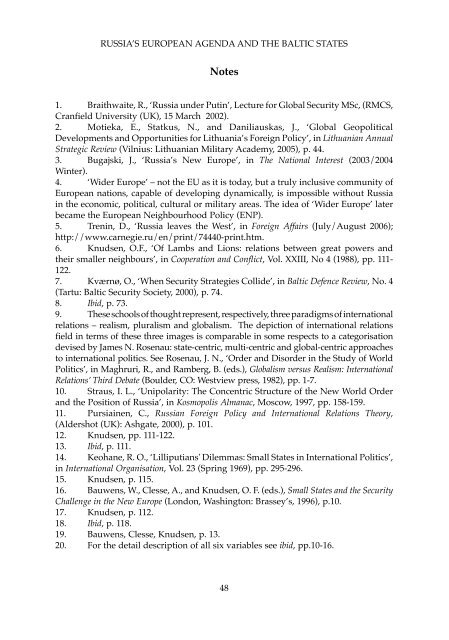Russia's European Agenda and The Baltic States - Defence ...
Russia's European Agenda and The Baltic States - Defence ...
Russia's European Agenda and The Baltic States - Defence ...
Create successful ePaper yourself
Turn your PDF publications into a flip-book with our unique Google optimized e-Paper software.
RUSSIA’S EUROPEAN AGENDA AND THE BALTIC STATES<br />
Notes<br />
1. Braithwaite, R., ‘Russia under Putin’, Lecture for Global Security MSc, (RMCS,<br />
Cranfield University (UK), 15 March 2002).<br />
2. Motieka, E., Statkus, N., <strong>and</strong> Daniliauskas, J., ‘Global Geopolitical<br />
Developments <strong>and</strong> Opportunities for Lithuania’s Foreign Policy’, in Lithuanian Annual<br />
Strategic Review (Vilnius: Lithuanian Military Academy, 2005), p. 44.<br />
3. Bugajski, J., ‘Russia’s New Europe’, in <strong>The</strong> National Interest (2003/2004<br />
Winter).<br />
4. ‘Wider Europe’ – not the EU as it is today, but a truly inclusive community of<br />
<strong>European</strong> nations, capable of developing dynamically, is impossible without Russia<br />
in the economic, political, cultural or military areas. <strong>The</strong> idea of ‘Wider Europe’ later<br />
became the <strong>European</strong> Neighbourhood Policy (ENP).<br />
5. Trenin, D., ‘Russia leaves the West’, in Foreign Affairs (July/August 2006);<br />
http://www.carnegie.ru/en/print/74440-print.htm.<br />
6. Knudsen, O.F., ‘Of Lambs <strong>and</strong> Lions: relations between great powers <strong>and</strong><br />
their smaller neighbours’, in Cooperation <strong>and</strong> Conflict, Vol. XXIII, No 4 (1988), pp. 111-<br />
122.<br />
7. Kværnø, O., ‘When Security Strategies Collide’, in <strong>Baltic</strong> <strong>Defence</strong> Review, No. 4<br />
(Tartu: <strong>Baltic</strong> Security Society, 2000), p. 74.<br />
8. Ibid, p. 73.<br />
9. <strong>The</strong>se schools of thought represent, respectively, three paradigms of international<br />
relations – realism, pluralism <strong>and</strong> globalism. <strong>The</strong> depiction of international relations<br />
field in terms of these three images is comparable in some respects to a categorisation<br />
devised by James N. Rosenau: state-centric, multi-centric <strong>and</strong> global-centric approaches<br />
to international politics. See Rosenau, J. N., ‘Order <strong>and</strong> Disorder in the Study of World<br />
Politics’, in Maghruri, R., <strong>and</strong> Ramberg, B. (eds.), Globalism versus Realism: International<br />
Relations’ Third Debate (Boulder, CO: Westview press, 1982), pp. 1-7.<br />
10. Straus, I. L., ‘Unipolarity: <strong>The</strong> Concentric Structure of the New World Order<br />
<strong>and</strong> the Position of Russia’, in Kosmopolis Almanac, Moscow, 1997, pp. 158-159.<br />
11. Pursiainen, C., Russian Foreign Policy <strong>and</strong> International Relations <strong>The</strong>ory,<br />
(Aldershot (UK): Ashgate, 2000), p. 101.<br />
12. Knudsen, pp. 111-122.<br />
13. Ibid, p. 111.<br />
14. Keohane, R. O., ‘Lilliputians' Dilemmas: Small <strong>States</strong> in International Politics’,<br />
in International Organisation, Vol. 23 (Spring 1969), pp. 295-296.<br />
15. Knudsen, p. 115.<br />
16. Bauwens, W., Clesse, A., <strong>and</strong> Knudsen, O. F. (eds.), Small <strong>States</strong> <strong>and</strong> the Security<br />
Challenge in the New Europe (London, Washington: Brassey’s, 1996), p.10.<br />
17. Knudsen, p. 112.<br />
18. Ibid, p. 118.<br />
19. Bauwens, Clesse, Knudsen, p. 13.<br />
20. For the detail description of all six variables see ibid, pp.10-16.<br />
48

















